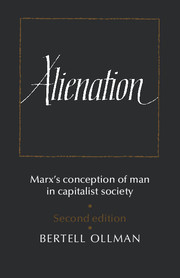Book contents
- Frontmatter
- Contents
- Preface to the second edition
- Note on translations
- Acknowledgements
- General introduction
- PART I PHILOSOPHICAL INTRODUCTION
- PART II MARX'S CONCEPTION OF HUMAN NATURE
- PART III THE THEORY OF ALIENATION
- 18 The theory of alienation
- 19 Man's relation to his productive activity
- 20 Man's relation to his product
- 21 Man's relation to his fellow men
- 22 Man's relation to his species
- 23 The capitalist's alienation
- 24 The division of labor and private property
- 25 The labor theory of value: labor-power
- 26 Value as alienated labor
- 27 The metamorphosis of value
- 28 The fetishism of commodities
- 29 Class as a value Relation
- 30 State as a value Relation
- 31 Religion as a value Relation
- 32 Marx's critique of bourgeois ideology
- PART IV CONCLUSION
- Appendix I In defense of the philosophy of internal relations
- Appendix II Response to my critics: more on internal relations
- Notes to the text
- Bibliography of works cited
- Index of names and ideas
- Cambridge Studies in the History and Theory of Politics
29 - Class as a value Relation
Published online by Cambridge University Press: 05 June 2012
- Frontmatter
- Contents
- Preface to the second edition
- Note on translations
- Acknowledgements
- General introduction
- PART I PHILOSOPHICAL INTRODUCTION
- PART II MARX'S CONCEPTION OF HUMAN NATURE
- PART III THE THEORY OF ALIENATION
- 18 The theory of alienation
- 19 Man's relation to his productive activity
- 20 Man's relation to his product
- 21 Man's relation to his fellow men
- 22 Man's relation to his species
- 23 The capitalist's alienation
- 24 The division of labor and private property
- 25 The labor theory of value: labor-power
- 26 Value as alienated labor
- 27 The metamorphosis of value
- 28 The fetishism of commodities
- 29 Class as a value Relation
- 30 State as a value Relation
- 31 Religion as a value Relation
- 32 Marx's critique of bourgeois ideology
- PART IV CONCLUSION
- Appendix I In defense of the philosophy of internal relations
- Appendix II Response to my critics: more on internal relations
- Notes to the text
- Bibliography of works cited
- Index of names and ideas
- Cambridge Studies in the History and Theory of Politics
Summary
Alienation is not solely an economic phenomenon. As already indicated, the worker's fourfold alienation in the means of production finds expression in all areas of his life. In one listing, ‘religion, family, state, law, morality, science, art, etc.’ are said to be the ‘particular modes of production’ which come under the law of private property. A mode of production, according to Marx:
must not be considered simply as being the reproduction of the physical existence of the individuals. Rather it is a definite form of activity of these individuals, a definite form of expressing their life, a definite mode of life on their part.
Under capitalism, all such expressions of life are facets of man's alienation by virtue of their internal relation to private property, or world of alienated objects, and fall under its law as the necessary steps to its full working out.
The life activity of the alienated individual is qualitatively of a kind. His actions in religion, family affairs, politics and so on, are as distorted and brutalized as his productive activity. The man taking part in these different activities, after all, is the same; his powers and needs stand at a particular level of their development, restricting all intercourse with nature within certain bounds. Nature, too, the world of objects through which man must realize himself, has developed apace with these powers and dictates from its side what is possible.
- Type
- Chapter
- Information
- AlienationMarx's Conception of Man in a Capitalist Society, pp. 202 - 211Publisher: Cambridge University PressPrint publication year: 1977



